Tessa Afshar's Blog
June 12, 2025
Hello world!
Welcome to WordPress. This is your first post. Edit or delete it, then start writing!
July 31, 2018
Road Trippin’ with Tyndale and Beth Vogt: Stop #5
Welcome to Tyndale Fiction’s Road Trip Scavenger Hunt! We’re so happy you are here. To participate, collect the key words through all 13 stops in order, so you can enter to win our grand prize giveaway {link http://www.crazy4fiction.com/2018/08/01/scavenger-hunt-giveaway/}!
Some details:
The adventure begins on Wednesday, August 1. You’ll have two weeks to make your way through all the stops (giveaways will close on Tuesday, August 14).
While you do not have to start at Stop #1 {linkhttp://francinerivers.com/road-trippin-with-tyndale-and-carla-laureano-stop-1}, keep in mind that the grand prize giveaway phrase will begin with the word you collect at that first stop.
To complete your submission for the grand prize giveaway, be sure to collect the key word within each author’s blog post, submitting the final, completed phrase in the form hosted on this page {link: http://www.crazy4fiction.com/2018/08/01/scavenger-hunt-giveaway/ }.
Also, be sure to enter the giveaways these authors are hosting on their blogs!
Enjoy the journey—we hope you’ll discover new books along the way as you hear from Tyndale Fiction authors about road trips, the settings of their novels, and more!
Happy road tripping!
———————-
I am delighted to introduce Christy and Carol Award–winning author Beth K. Vogt. Beth’s latest release, Things I Never Told You, can best be described as a contemporary “Little Women gone wrong” story. Torn apart by a tragic accident that occurred ten years ago, three sisters must decide whether to harbor old resentments or band together to face a new hardship that is threatening their family. Anyone who has siblings can relate to these characters and their unique roles within their family.
Join Beth and her characters on a road trip to beautiful Colorado, Beth’s home state and the setting for her story. Welcome, Beth!

Summer Road Trip: Colorado
Welcome to Colorado, the home state of the Thatcher sisters—Johanna, Jillian, Payton, and Pepper—the sibling-catalyst for my “Little Women gone wrong” novel, Things I Never Told You.
I’ve lived in Colorado for twenty years—the longest I’ve lived anywhere since marrying my (now-retired) military spouse. My youngest child was born in Colorado and proudly boasts the prized “NATIVE” sticker on her Subaru, which many consider the state car.
While the Thatcher sisters’ emotional closeness is minimal at best, they’re all Colorado natives who’ve grown up, gone to college, and chosen to stay in Colorado.
But I’ll let three of the sisters tell you why they love this state so much.
(Yes, I’m treating fictional characters like real people. I’m a writer—it’s what I do.)

Johanna (sitting with Payton and Jillian at the table in their parents’ breakfast nook): Why are we in here, instead of outside with Mom and Dad? I thought this was a weekend cookout.
Jillian: We need to talk.
Johanna: Talk? What about?
Jillian: Colorado.
Johanna: Colorado? Is this a geography quiz?
Payton: Stop interrupting, Johanna, and let Jillian explain.
Johanna sits back in her chair, crossing her arms.
Payton (motioning toward Jillian) : Go ahead, Jill. She’s pouting, but she’s listening.
Jillian (rushing ahead before Payton and Johanna can get into an argument): You know that author who wrote a book about us? Things I Never Told You?
Johanna: Oh, yeah—I definitely want to talk to her. She got me so wrong in that book!
Payton: We’re not talking about us!
Jillian: She’d like us to talk about Colorado.
Johanna: Colorado? Why?
Payton: Maybe because we live in Colorado?
Johanna: Why should I do anything for an author who made me out to be a control freak?
Payton (speaking in a whisper): Sounds like she knows you pretty well.
Johanna: What was that?
Jillian: Ignore her. If we don’t talk about Colorado, then that author is going to put words in our mouths. Again.
Johanna: I’m in.
Payton: Me too.
Jillian: Great. What would we tell people about Colorado?
Silence.

Jillian: Nobody has anything to say about Colorado? Favorite places, maybe? What about the old penny arcades in Manitou Springs that Mom and Dad took us to when we were kids? Geoff and I went there on a date night once. Or the Colorado Springs Labor Day Lift Off, when they launch all the hot air balloons in Memorial Park?
Payton (leaning forward with a smile on her face): I liked growing up in the Springs—seeing Pikes Peak every day—the sunrises and the sunsets. But now I prefer living in Denver because I can get to the mountains within an hour or two. City life and hiking or skiing in the mountains so close together. This year I’m determined to make it to the snow-sculpting competition in Breckenridge.

Johanna: How many years have you said that, Payton?
Payton: Too many, I know. I’m surprised you haven’t kept track of the exact number, big sister.
Jillian: What about you, Jo?
Johanna: I’m proud I’m a Colorado native—I have no plans to leave. Colorado Springs knows how to do winter: it snows one day and then the sun comes out and 24 hours later the snow is gone.
Jillian: Favorite place?
Payton and Johanna (speaking in unison): The Broadmoor.
Laughter.
Johanna: Where else? It’s elegant. It has the best restaurants. The staff knows how to treat you right. I love their spa. And it’s beautiful . . . I walk onto the property and just relax.

Payton: What about Garden of the Gods? No matter how many times I’ve been there, I always take dozens of photos of the red rock formations—Balance Rock, Siamese Twins, the lone White Rock.
Johanna: Look, we could list beautiful things about Colorado all day long. Do you think we’ve done enough to make that author happy?
Payton: I don’t know—writers can be temperamental.
Jillian: Be nice. She’s going to read what we said. Besides, she probably has a word count. I think we’re good.
————–
Here’s the Stop #5 Important Information:
You can purchase Beth’s book, Things I Never Told You, here. {link: https://www.tyndale.com/p/things-i-never-told-you/9781496427243}
Clue to write down: trips
Link to Stop #6, the next stop in the scavenger hunt: Beth’s site: https://bethvogt.com/giveaway/road-tr...
—————-
Tessa’s Giveaway: A $25 Amazon Gift Card to one winner
If you want to read blog #4 by Tessa Afshar, please go to: {link: http://www.jolinapetersheim.com/blog/ }
July 14, 2014
‘In the Field of Grace’: The Story Behind the Bible Story of Ruth
 Today I’d like to share two more wonderful reader reviews of In the Field of Grace. (Reprinted with permission from the authors.)
Today I’d like to share two more wonderful reader reviews of In the Field of Grace. (Reprinted with permission from the authors.)
Bringing a well-known biblical tale to life…
By Nastassja Loots, Pretoria, South Africa
A Literary Labour of Love blog
In The Field of Grace is fourth book by Tessa Afshar, and is a sequel of sorts to my beloved Pearl In The Sand. It tells the story of Salmon and Rahab’s son, Boaz, and his Ruth; one of the most famous love stories in the Bible.
As with her previous books, Afshar brings to life a well-known Biblical tale in a marvellously realistic way. I feel like I’ve experienced indifference from a family in Moab, hostility from a community in Bethlehem, gleaned wheat in Boaz’ fields, fallen in love with the perfect gentleman in an olive grove and found a love so pure it will be remembered for thousands of years.
The book of Ruth is a short one of only four chapters, but Afshar has managed to turn Ruth’s story into a very believable account of what Ruth’s life could have been like.
As much as In the Field of Grace (and the book of Ruth) is about the love Ruth bears for Boaz, it is also about the love Ruth bears for her mother-in-law, Naomi. Even after the death of her husband, Ruth refused to separate from Naomi. Instead, she joined Naomi in a move to Jerusalem, a place where she knew she would be unwelcome at best.
Ruth’s love for Boaz and her love for Naomi carry equal weight in this telling, a very clever touch, as historically Ruth is as well known for her love for Naomi as she is for her love for Boaz. My only complaint in this regard (and it is a tiny one) is that Ruth and Boaz only meet approximately 25% into the book – I adore Boaz and I love him and Ruth together, so this complaint is just me being greedy and wanting even more of them.
I find it wonderfully poetic that Boaz falls in love with – and marries – a Caananite who came to love Jesus, much like his father and mother. Rahab’s pearl earrings also make their way into the tale of Ruth and Boaz’ romance; a lovely touch by the author that made me extremely happy.
I love all the colourful characters in the book. Ruth is wonderful; her legendary courage and loyalty is brought to life so beautifully. Likewise, the character of Boaz is every inch the perfect gentleman, tender and kind – just like the Bible portrays him. I felt very frustrated by Naomi at times, but I think in that the author illustrated just how bitter Naomi had become after the death of her husband and sons, and how Ruth’s love and God’s grace ultimately healed her hurts. I adore Dinah and Adin and wish there was even more of them!
Tessa Afshar has become one of my favourite authors, flawlessly bringing life to tales from the Bible. I eagerly anticipate each of her new books, and she doesn’t let me down. I don’t know what Afshar plans to write next, but I am still clinging to hope for a book about Lysander and Roxanne (from Harvest of Gold). Here’s hoping.
Really, really good read
By Honeypie Baniqued, the Philippines
In the Field of Grace tells the complete, but fictional story of Boaz and Ruth, and of Naomi, Ruth’s mother-in-law. To read the TRUE STORY, read Ruth’s book in the Bible.
The book of Ruth in the Bible is only four chapters long. And honestly, when I read it, I didn’t really know what the fuzz was all about of Ruth following Naomi’s “orders.”
I think In the Field of Grace shares a clearer version of the life of Ruth before she met Naomi, and before she met Boaz. She was born a Moabite, which in case you don’t know are “idol-worshippers.”
Naomi (and Naomi’s son Mahlon, who was Ruth’s first husband) introduced the Lord to her. So I guess that’s how important the role of Naomi is. It definitely shares the story mostly from Ruth’s perspective, her fears and doubts of going to Bethlehem, and of marrying Boaz.
There were some connections made to David (who is Ruth and Boaz’ great-great grandson) and Solomon, who is David’s son. And of course, let’s not forget, a direct relative of our Lord.
This book is a really, really good read. I recommend it, especially to those who have hesitations in reading the Bible. It’s not an alternative, but most definitely an aid. I have to say that after reading this book, I think I’m able to understand better the story beneath the lines.
Click here to read more reader reviews of In the Field of Grace.
July 7, 2014
Seeing God in the Details – ‘In the Field of Grace’ Reviews
 I’d like to share with you three reader reviews of In the Field of Grace. These reviews were originally published on Amazon, and the authors have given me permission to reprint their reviews on my blog.
I’d like to share with you three reader reviews of In the Field of Grace. These reviews were originally published on Amazon, and the authors have given me permission to reprint their reviews on my blog.
An Honest, Amazing Read
By Kandi Hamble, New Brighton, MN
I need to remember to not read Tessa’s books just before bed…I know it will happen – it always does! I say to myself, “One chapter, just one! Maybe two…” But then I read through the night and when my eyes finally rebel and say no more it’s almost time to get up for the day!
Tessa has honed her story telling talent well! She fleshes out Biblical characters and makes them real people, so real it feels like maybe I could be sitting in Ruth’s living room hearing her tell her story.
Ruth struggles with some of the same things I do, and as she learns new things about trusting God and becoming more like Him, so do I! There are light bulb moments and there are laugh-out-loud moments. I cried along with Naomi, Ruth, and Boaz as they lose loved ones and struggle with God in the midst of such deep sorrow and celebrated in their joy.
Another well done book by Tessa Afshar! It did not disappoint. It was as challenging and as entertaining as I anticipated it would be.
Another Gift of Love and Grace from Tessa Afshar
By Kathleen Jasper, Seattle, WA
Tessa Afshar has outdone herself this time. This book is incredible. I was completely hooked after the first chapter, and couldn’t put it down. I just absolutely loved Ruth, Boaz and Naomi. The Bible came alive for me, as it always does when I read Tessa’s books. I love how Our Lord speaks to me in her words, and actually allows grace, wisdom and strength to flow in my own life from the pages of her book. Tessa has such knowledge of the Bible, and is incredible with her gift of word imagery. In the Field of Grace is definitely a must-read!
Didn’t Want it to End
By Umika Porter, Fontana, CA
This was an intriguing love story. The way Tessa Afshar writes makes it hard to put the book down and you end up never wanting the story to end. She did it again with In the Field of Grace, the story of Ruth and Boaz.
I love how she expanded the story but still keeps it in line with historical and biblical facts. The reference to the pearl earring from her book, Pearl in the Sand was great… love how she ties things together.
This book ignites your passion and love for the living God. It also lets you see that God is in every detail of your life working things together for your good….it all becomes a part of the big plan called PURPOSE/DESTINY! Highly recommended.
June 24, 2014
Christy Awards, ICRS, and a New Book Release
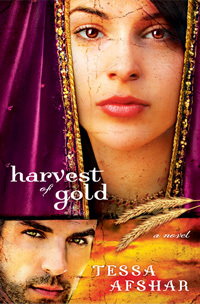 I confess; I’m feeling more than a little dazed and overwhelmed today. Last night, my book, Harvest of Gold, was honored with the 2014 Christy Award for Best Historical Romance. I am so blessed to work in an industry that honors Jesus. And the Christy feels good too!
I confess; I’m feeling more than a little dazed and overwhelmed today. Last night, my book, Harvest of Gold, was honored with the 2014 Christy Award for Best Historical Romance. I am so blessed to work in an industry that honors Jesus. And the Christy feels good too!
A bit about the Christy Awards: They honor and promote excellence in Christian fiction. The fifteenth annual presentation was at the Atlanta Marriot Marquis. Here’s the official press release.
I’ve been buzzing around the convention center in Atlanta, taking in the sights and sounds of the International Christian Retail Show (ICRS), the world’s largest gathering of Christian authors, musicians, and artists.
Book Giveaway
On top of all this excitement, my fourth novel, In the Field of Grace, releases a week from today, on July 1.
But I’ve decided to start celebrating now, and I invite you to join me. Starting tomorrow – Wednesday, June 25 at 8 a.m. Eastern Time, I’ll be giving away a copy of In the Field of Grace daily through Friday on my Facebook page.
Entering is super-easy. Each day, I’ll give you a prompt, and all you need to do is like the update, fill in the blank, or answer the question. I’ll announce each day’s winner on my Facebook page after 8 p.m. Eastern Time.
Watch for a graphic that looks similar to this one tomorrow on my Facebook page:
 More Chances to Win Fantastic Prizes
More Chances to Win Fantastic PrizesStarting July 1, my book’s official release date, I’ll be hosting a sweepstakes on my Facebook page. You’ll have the opportunity to win some super prizes, such as an Apple iPad Mini, gift card, book bundles and more. Be sure to visit my Facebook page https://www.facebook.com/AuthorTessaAfshar daily from July 1-18 – you can enter the contest once per email address per day!
Read a Sample Chapter Right Now
You may be wondering, “What’s In the Field of Grace about, anyway?”
I’m glad you asked. It’s the story of Ruth and Boaz – a love that ultimately changes the course of Israel’s destiny and the future of the whole world. Visit my website and click “Read Sample Chapter” to read the Prologue and Chapter 1.
If you enjoy it, the document includes sharing buttons for Facebook, Twitter, and Google+, and you can also embed it on your own blog.
September 17, 2013
Lighting and Large Families
Last year, after several storms of biblical proportions in my area, we went through a long string of days without electricity. Lacking camping equipment, I had to make do with candles in my house. I was astounded by how dark nighttime really is. Electricity has bamboozled those of us who have grown up in the twentieth and twenty-first centuries into believing that evenings aren’t all that different from daytime hours. But the darkness is truly impenetrable once the sun sets. There is a kind of pitch black to which your eyes don’t grow accustomed. Candles can’t stand up to the all-consuming power of it. You need a lot of candles to light the room enough to be able to read, even a little, for example.
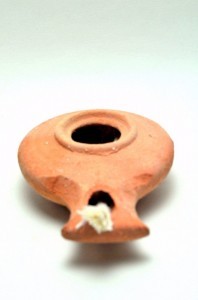
Of course, in biblical times they did not have candles. They weren’t invented yet. They had lamps, usually made of pottery, with a linen wick, which burned olive or other oil. If they could afford it, they let one lamp burn through the night.
But you can imagine the heavy darkness that blanketed their world come sunset. A few lamps hardly made a dent. That’s probably why they often had such large families. Everyone looked attractive in that lighting, which is why when you want a romantic atmosphere, you dim the lights and light candles. Besides, there wasn’t much else to do. There were no reruns of Matlock, and Arthur Conan Doyle hadn’t written Sherlock Holmes yet. People went to bed early and woke up early, either with the rising of the sun, or just before (another reason I am glad I wasn’t born then.)
To avoid fires, they placed these lamps on lampstands if they could afford one. The common folk simply over-turned a bushel and used that as a lampstand. That’s why Jesus said people don’t light a lamp and put it under a bushel; that lamp gives light to all in the house. (Matthew 5: 14 -16) It would have struck the people living in biblical times as an absurd picture to put your lamp under your bushel basket. In the same way, Jesus says that His followers are the light of the world, and they must burn bright like a lamp that lightens the community around them.
September 2, 2013
Animals in Biblical Times
Although Jesus never had a pet that we know of, He does talk a fair bit about animals. For example, He says that not a single sparrow is forgotten before God (Luke 12:6). There are almost 100 animals named in the Bible, although we can’t identify some of these creatures with certainty due to linguistic challenges. The animals that most often occupy the average person’s world today–dogs and cats–don’t hold a very important place in the Bible. A few animals in the Bible are worthy of special mention:

Eagle
Because of its great wingspan, an eagle is able to soar higher than most birds, flying above storms and dangerous weather patterns. In addition, if you watch an eagle fly, you will notice very little flapping as it spreads its wings; this helps the eagle conserve energy. The faithful are promised that if they wait upon the Lord, they shall renew their strength; they shall mount up with wings like eagles (Isaiah 40:31). Like the eagle, if you wait upon the Lord, you’ll be able to mount so high that you will bypass many storms, and while mid the flights of life, you won’t grow weary easily. On the other hand, if you rely solely on your own strength, you might find yourself more like the Dodo bird, unable to fly and on your way to extinction.

Lion
There are two famous lions in the Bible. There is the one we should be wary of—our adversary the devil who “prowls around like a roaring lion, seeking someone to devour” (1Peter 5:8)—and the one we should turn to, the Lion of Judah (Revelation 5:5), who is Jesus. The good news is that compared to the Lion of Judah, the roaring lion is just a little mewling cat.
Foxes
Foxes aren’t looked upon kindly in the Bible. They are little and wily and often destructive. In the Song of Solomon, we are told to catch the foxes, “the little foxes that spoil the vineyards.” (Song of Solomon 2: 15). Foxes ruin vines and destroy the fruit. In spite of their small size, they can cause a lot of damage. Do you have little foxes in your life? Things that seem inconsequential, but could be ruining your marriage, your finances, your character, or your relationship with God?
Sheep
One of the animals that gets a lot of attention in the Bible is sheep. Jesus calls Himself the Good Shepherd and David calls the Lord his shepherd. This makes you and me sheep, which isn’t a bad deal when you consider the shepherd’s role as protector and provider. The sheep don’t get to lie around and be lazy. They have to be willing to be led to green pastures, something not easy to find in the plains of Israel. But if the sheep cooperate, a wise and good shepherd can lead them where they know no want and the waters are still.
Balaam’s Donkey
Upon occasion, Biblical animals appear to be smarter than the humans. This is a trend that seems to continue in our world today when you consider the behavior of some people. Balaam’s donkey was such an animal. Balaam was a prophet during the time of conquest. When Israel encamped the plains of Moab, the King of Moab, Balak, sent for Balaam, expressly to have him curse Israel (Numbers 22). The Lord told Balaam not to go, but eventually, Balaam gave in and went. On the way, God sent His angel to prevent Balaam from going. Balaam’s donkey saw the angel and tried to avoid him, knowing that the life of her master was in danger. Three times he did this and Balaam, who wasn’t as wise as his donkey and missed the presence of the angel, hit his donkey in frustration. Finally, the donkey opened her mouth with God’s help and said, “What have I done to you, that you have struck me these three times?” and she pointed out the angel to Balaam. After that, Balaam straightened out his act and instead of cursing Israel, he blessed them four times.
This means if you are too stupid to listen to God, He can make even a donkey speak up to sort you out. Whenever I have to speak publicly, I find comfort in the fact that God opened the mouth of Balaam’s donkey. If a donkey can speak sense with God’s help, then so can you and I.
August 25, 2013
Foot Washing
Nowadays when you visit someone’s home, you don’t expect anyone to wash your feet. Frankly, it would be rather awkward if someone offered, and might be cause for a 911 call. In the time of Jesus, however, foot washing was an expected part of hospitality. The reason for this may not be instantly recognizable to those of us living in developed countries. But it was a real necessity back then.
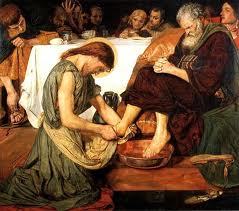
Here is a modern day glimpse into why foot washing was such a big deal in Jesus’ day:
The town I live in used to be rural, with lots of farmland and fruit orchards. Some of that land is still cultivated, and you can enjoy fresh fruit and produce from town. We also have a few horse farms and our residents like riding. Once the weather turns pleasant, horseback riders are a common sight in the country roads. They often leave a steamy, rather pungent gift behind them, and you have to be careful where you step.
In the glaring absence of Fords, Subarus, and Toyotas during Jesus’s day, what they had a lot of was oxen, horses, donkeys, camels, and asses. In addition, flocks of sheep were moved from country paddocks into the city for sale. Not to put too fine a point on it, there was a lot of poop on the road. Carts would unintentionally spread the goods around to make sure the walking citizenry didn’t miss their chance at stepping on some aromatic treasure.
Even if you had just left one of the roman baths, all clean and shining with perfumed oils, by the time you arrived home, your sandaled feet would be already filthy. Because your feet weren’t merely dirty with the dust of the road, cleaning them was considered a truly nasty job, relegated to slaves.
You can imagine how incredible it was when Jesus wrapped a towel around His waist and knelt down to wash His disciples’ feet. He was choosing to wash the dirtiest part of them, the most disgusting, off putting, smelly part of them. The astonishing thing is that He hasn’t stopped doing that. He is still looking for our smelliest, dirtiest bits; He is still kneeling down before you and me and washing away, until He calls us clean.
August 16, 2013
Biblical Marriage
Marriages were often arranged in biblical times. Even Adam’s marriage was arranged by his Father, although he was given considerably less choice in the matter than the rest of us, since there was only the one woman to pick from. On the other hand, this reduced the chances of his getting it wrong. So although they got kicked out of Eden, at least Adam and Eve didn’t end up divorcing, which is good as God had not gotten round to creating divorce lawyers yet. Of course, they probably thought about it once the kids started acting out, murdering each other and naughty things like that.
Romance and personal desire were not the most important factors in choosing your spouse back in the days of the Bible. That did not mean that love and passion were completely unheard of. If you don’t believe me, read Proverbs 5:18-19.
Back then, people were concerned with things like family connections and increasing wealth and land through marriage. It may sound mercenary, but really it was a matter of survival. Parents arranged marriages quite early, so that men and women would often be married in their teenage years. Although polygamous marriages were common in the Old Testament era among those wealthy enough to support more than one wife (think Jacob, David, Solomon), by the time of the early church, it was already frowned upon.
Parents had a big role in securing a spouse for their children. The father of a young single man would look around for a suitable girl, and finding one, would go to her parents’ house to ask for her hand. A lot of financial haggling couched in subtle diplomatic language later, and the betrothal would take place after settling on a bride price. Although the betrothal was an airtight legal document, much more serious than our present day engagements, the marriage was not consummated until the wedding day.
When the betrothal was sealed, the prospective bridegroom would tell his bride: I go to prepare a place for you, which is exactly what Jesus told His disciples before being crucified. The bridegroom would spend several months to a year preparing a nice little addition to his Dad’s house, where he and his wife would live. Then he would return, often in the middle of the night to surprise his bride and fetch her home. And that is what Jesus will do for His bride, the church.
As a single woman, I find the old custom of arranged marriages both horrifying and strangely appealing. The thought of the kind of men my father might drag to my door is truly chilling. On the other hand, all the pressure would be off. So, maybe, not as bad as it sounds.
August 10, 2013
Coco Chanel and Biblical fashion
Have you ever woken up in the morning and wondered what you were going to wear? The average woman in biblical times would not have had that problem. Her wardrobe was simply too limited. She might have a change of clothes or two. But that was about it. Coco Chanel and Prada would have wept daily.
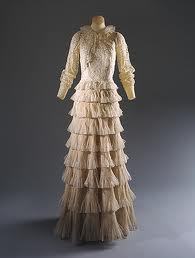
Design by Coco Chanel
Because fabric is destroyed easily through the ravages of time, we don’t have a lot of archaeological evidence that would give us exact fashion descriptions from this period. As it so happens, all the copies of Vogue from the Biblical era have also been eradicated (probably by angry husbands with high credit card bills), which leaves us with basic information and a few educated guesses.
If you were not rich, you wore a tunic, usually wool and long, if you could afford the extra fabric. (Men also wore tunics, but theirs would be shorter.) This was a simple, shapeless garment without darts or tucks, cut straight on the sides, or sometimes woven as a whole, like Jesus’s garment for which the Roman soldiers gambled.
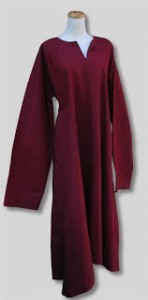
Some women would have had embroidery on their garments, and the wealthier people would have been able to dress up their clothes with accessories such as earrings, armbands, and necklaces. In my visits to different museums around the world, I’ve seen a number of gems and precious metals favored by the people of biblical times, among them carnelian, gold, lapis lazuli, and turquoise. Many other gemstones are named in the Bible, as well.
At the height of summer, the temperature in parts of Israel can rise to well over 100 degrees Fahrenheit. Imagine wearing a big wool garment all the way to the floor, without even the comfort of deodorant. On the other hand, you were never expected to wear pantyhose, which must have been an act of grace from God, because as far as I am concerned, those things are an instrument of the devil.
When the weather turned colder, over the tunic you would wear a mantle, though not everyone could afford one. With a bigger budget, you could afford linen for the summer. And for the very rich, there was silk. Both men and women would wear a sash or belt—leather for the financially challenged, and linen or wool for everyone else. The sash worked like pockets, and you could tuck things inside.
Women generally wore a light veil that covered their hair, although they could remove it inside the house, and sometimes outdoors as well. The weather in the Middle East can be rough on the skin, and the veil helped protect your face.
We are a bit fuzzy when it comes to undergarments. They might have worn simple loincloths, or something along the lines of a short slip. The truth is that the Israelites weren’t in the habit of drawing pictures of women in their skivvies. We find our concepts from Egyptian drawings and Assyrian art. One thing for certain, Victoria’s Secret would have gone bust in the times of the Bible, which is not so tragic.



